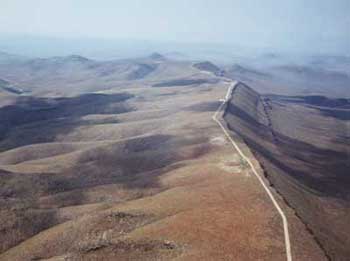 Comprehensive information about what chemicals are sprayed on food crops just got much harder to come by. The U.S. Department of Agriculture recently announced that they will no longer conduct and publish annual national surveys of "which states apply the most pesticides and where bug and weed killers are most heavily sprayed to help cotton, grapes and oranges grow." The report is used extensively by farmers, environmental advocates, chemical companies and even the U.S. Environmental Protection Agency. Don Lipton, a spokesman for the American Farm Bureau, said "farmers will be subjected to conjecture and allegations about their use of chemicals and fertilizer. Given the historic concern about chemical use by consumers, regulators, activist groups and farmers, it's probably not an area where lack of data is a good idea." One fear is that information will only be available after there's been a problem. Steve Scholl-Buckwald of the Pesticide Action Network explained, "What we'll end up doing is understanding pesticide use through getting accident reports. And that's a lousy way to protect public health."
Comprehensive information about what chemicals are sprayed on food crops just got much harder to come by. The U.S. Department of Agriculture recently announced that they will no longer conduct and publish annual national surveys of "which states apply the most pesticides and where bug and weed killers are most heavily sprayed to help cotton, grapes and oranges grow." The report is used extensively by farmers, environmental advocates, chemical companies and even the U.S. Environmental Protection Agency. Don Lipton, a spokesman for the American Farm Bureau, said "farmers will be subjected to conjecture and allegations about their use of chemicals and fertilizer. Given the historic concern about chemical use by consumers, regulators, activist groups and farmers, it's probably not an area where lack of data is a good idea." One fear is that information will only be available after there's been a problem. Steve Scholl-Buckwald of the Pesticide Action Network explained, "What we'll end up doing is understanding pesticide use through getting accident reports. And that's a lousy way to protect public health."

 The
The  The pharmaceutical company
The pharmaceutical company  As CMD
As CMD  Comprehensive information about what chemicals are sprayed on food crops just got much harder to come by. The
Comprehensive information about what chemicals are sprayed on food crops just got much harder to come by. The  Increasingly, people are coming to the conclusion that the proposed nuclear waste dump at Yucca Mountain, Nevada might never open. Former Louisiana Senator J. Bennett Johnston, "the lawmaker perhaps most responsible" for advancing the plan for a permanent waste repository at Yucca, now says the "project should never have been billed as a place to hold waste indefinitely," reports Lisa Mascaro.
Increasingly, people are coming to the conclusion that the proposed nuclear waste dump at Yucca Mountain, Nevada might never open. Former Louisiana Senator J. Bennett Johnston, "the lawmaker perhaps most responsible" for advancing the plan for a permanent waste repository at Yucca, now says the "project should never have been billed as a place to hold waste indefinitely," reports Lisa Mascaro. New York Times reporter Melody Petersen, who covered the
New York Times reporter Melody Petersen, who covered the